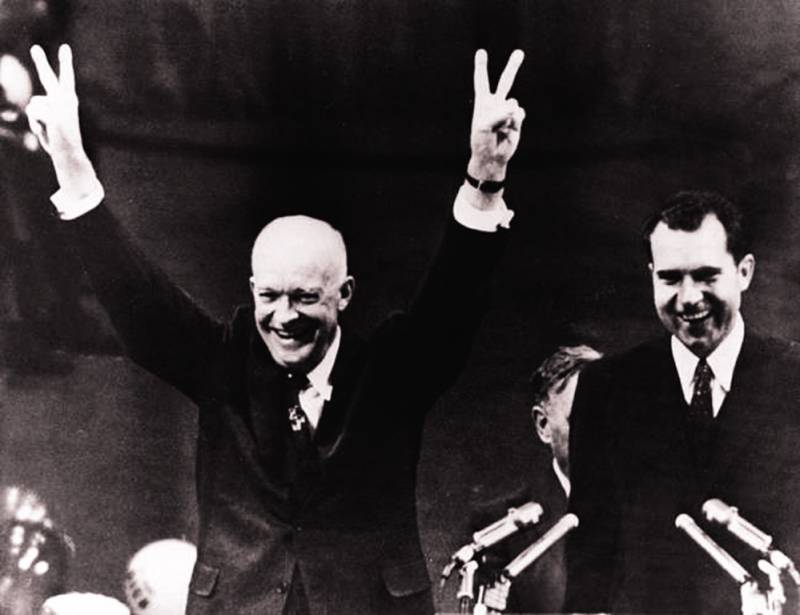
This photograph shows Dwight D. Eisenhower (left) and Richard Nixon at the 1956 Republican convention after being renominated in San Francisco.
Eisenhower successfully ran for reelection against Adlai Stevenson, the former Illinois governor whom he had defeated four years earlier.
Eisenhower, who had first become famous for his military leadership in World War II, remained widely popular. A heart attack in 1955 provoked speculation that he would not seek a second term, but his health recovered and he faced no opposition at the 1956 Republican National Convention. Stevenson remained popular with a core of liberal Democrats, but held no office and had no real base. He defeated New York Governor W. Averell Harriman and several other candidates on the first presidential ballot of the 1956 Democratic National Convention. Stevenson called for a significant increase in government spending on social programs and a decrease in military spending.
With the end of the Korean War and a strong economy, few doubted that the charismatic Eisenhower would be reelected. Supporters of the president focused on his “personal qualities...his sincerity, his integrity and sense of duty, his virtue as a family man, his religious devotion, and his sheer likeableness,” rather than on his leadership record. The weeks before the election saw two major international crises in the Middle East and Eastern Europe, and Eisenhower’s handling of the crises boosted his popularity.
Eisenhower slightly improved on his 1952 majorities in both the popular and electoral vote. He increased his 1952 gains among Democrats, especially Northern Catholics and city-dwelling White Southerners. Although he lost Missouri, he picked up Kentucky, Louisiana, and West Virginia. This was the last presidential election before the admissions of Alaska and Hawaii in 1959, the last election in which any of the major candidates had been born in the 19th century, and the most recent election to have been a rematch of a previous election.
Eisenhower successfully ran for reelection against Adlai Stevenson, the former Illinois governor whom he had defeated four years earlier.
Eisenhower, who had first become famous for his military leadership in World War II, remained widely popular. A heart attack in 1955 provoked speculation that he would not seek a second term, but his health recovered and he faced no opposition at the 1956 Republican National Convention. Stevenson remained popular with a core of liberal Democrats, but held no office and had no real base. He defeated New York Governor W. Averell Harriman and several other candidates on the first presidential ballot of the 1956 Democratic National Convention. Stevenson called for a significant increase in government spending on social programs and a decrease in military spending.
With the end of the Korean War and a strong economy, few doubted that the charismatic Eisenhower would be reelected. Supporters of the president focused on his “personal qualities...his sincerity, his integrity and sense of duty, his virtue as a family man, his religious devotion, and his sheer likeableness,” rather than on his leadership record. The weeks before the election saw two major international crises in the Middle East and Eastern Europe, and Eisenhower’s handling of the crises boosted his popularity.
Eisenhower slightly improved on his 1952 majorities in both the popular and electoral vote. He increased his 1952 gains among Democrats, especially Northern Catholics and city-dwelling White Southerners. Although he lost Missouri, he picked up Kentucky, Louisiana, and West Virginia. This was the last presidential election before the admissions of Alaska and Hawaii in 1959, the last election in which any of the major candidates had been born in the 19th century, and the most recent election to have been a rematch of a previous election.

